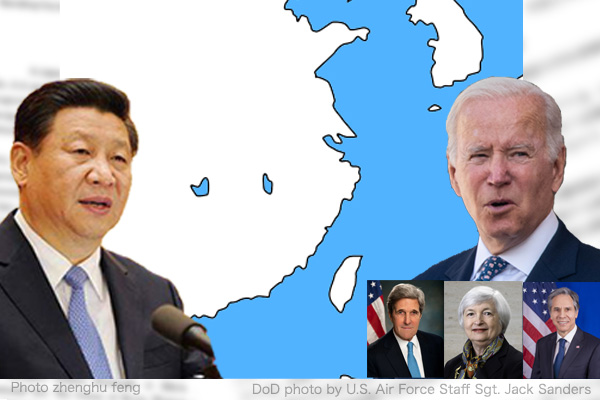U.S. Special Envoy for Climate Change John Kerry visited China in mid-July and met with foreign policy chief Wang Yi, a member of the Chinese Communist Party (CPP) Politburo, and other senior Chinese officials.
In response to Kerry's insistence that climate change measures should be promoted separately from other political issues, Wang pointed out that all issues were linked in the U.S.-China relationship and that no in-depth decarbonization agreement was possible unless the U.S. side acted in accordance with China's wishes particularly on the Taiwan issue.
Kerry, who wants to make an epoch-making breakthrough in carbon reduction, should have advised President Joe Biden upon his return home to refrain from adopting policies that would make China uncomfortable.
This represents a bad pattern seen since the start of the Biden administration. There are concerns that the administration, which wrongly recognizes climate change as being the greatest national security threat, may make a step forward in the direction of appeasing China. The biggest security threat is clearly the CCP regime.
U.S. cabinet-level officials visiting Beijing one after another
Prior to Kerry’s visit, U.S. Treasury Secretary Janet Yellen visited Beijing. This was also risky.
A Taiwan policy bill, which was the focus of attention in the U.S. Congress last year, called not only for deepening U.S.-Taiwan military cooperation but also for imposing financial sanctions as a pillar of strengthened deterrence against China if China stepped up pressure on Taiwan.
However, the Treasury Department showed reluctance in line with Wall Street’s wishes to stabilize the investment environment, leading all financial sanction provisions to be dropped from the bill at the final stage. In blocking financial sanctions, the CCP and the Treasury Department acted as de facto partners.
In this regard, former Secretary of State Mike Pompeo wrote an interesting episode in his memoirs. In response to Hong Kong's suppression of freedom in May 2020, the Trump administration removed special preferential business treatment granted to Hong Kong. However, an additional measure of imposing financial sanctions on London-based HSBC Bank, a key player in the CCP's money laundering, came under strong opposition from giant financial institutions on the Wall Street that saw such sanctions as injuring the U.S. economy. Pompeo derided the injury as meaning that their bonuses would be reduced. As the Treasury Department partnered with Wall Street then, however, the sanctions proposal eventually disappeared.
Before Yellen’s visit, Secretary of State Antony Blinken flew to Beijing despite the fact that China had just rejected a U.S. proposal for a U.S.-China defense ministers meeting in Singapore on the occasion of Shangri-La Dialogue, an annual Asian security conference. Blinken was greeted at the airport not by his counterpart Wang or Foreign Minister Qin Gang but by a lower ranking Foreign Ministry director-general.
The series of visits to Beijing by U.S. cabinet-level officials could be described as wooing.
U.S. weakness behind China's picking holes in Japan
In mid-July, the Chinese government criticized Japan’s planned ocean release of treated water from a nuclear power plant as the proliferation of ‘contaminated water’ and effectively banned imports of Japanese seafood despite the fact that the treated water is scientifically proven safe.
Generally speaking, when U.S.-China relations are tense, China tends to come out in a smiling diplomacy towards Japan in a bid to drive a wedge between Japan and the United States. When U.S.-China relations ease, however, China becomes tough against Japan.
Given the Biden administration's soft stance towards China, Japan will continue to face unreasonable Chinese attacks unless Japan takes its own countermeasures against China.
Yoichi Shimada is a senior fellow and Planning Committee member, Japan Institute for National Fundamentals, and a professor emeritus at Fukui Prefectural University.


